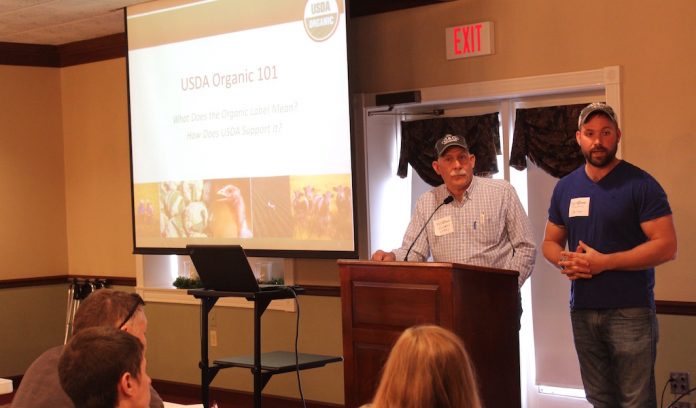WALNUT CREEK, Ohio — Beginning farmers usually need as much advice as they can get, and one group got a wide variety of such advice during a National Farmers Organization meeting April 4 at the Carlisle Inn.
As part of its FarmStarts program, the NFO organized an experienced group of farmers and marketers for a day-long discussion on some of the issues facing beginning farmers.
Howard Spray, an organic grain producer from Mount Vernon, talked about his family’s history in organic farming, and the Angus beef cattle that he raises.
Spray’s family started the farm in the late 1940s, and operated it as a conventional farm up until about 1970, when they started going organic. Spray said the organic market, and working with cooperatives and organizations like NFO, have helped him secure a premium for his products.
But he still has to think ahead about marketing, how much he’ll have and where it all will go. Howard and his family farm about 600 acres, in rotations that include soybeans and corn, clover and wheat.
Organic marketing
John Bobbe, executive director for the Organization for Relationship Marketing (OFARM), talked about the importance of marketing organic products. Growing a certified organic crop is one thing, but if you want to get a good return, you need to do your homework, he said.
A big mistake, he said, is “believing that marketing costs nothing or someone will do it for you for nothing.”
Bobbe said organic producers can expect to pay 5.5-6.5 percent of gross sales toward marketing.
Another mistake is failing to negotiate prices. He reminded the farmers that the buyers of their products are usually out for the lowest price possible. He said it’s part of a buyer’s job to negotiate low, but the farmers need to consider their own needs when negotiating.
Working together
He said farmers can do their own marketing if they choose, but it usually serves them better if they work cooperatively or join a farmer’s co-op.
“Over time, the track record shows that farmers who cooperate with each other and go to the marketplace together with an agent that’s experienced in grain marketing, tend to come out better than going it alone into the marketing place,” Bobbe said.
A third mistake, according to Bobbe, is failing to GMO test your crops. If you’re selling into the food grade market, you should expect your crop will be tested.
Betty Kananen, the founder of Global Organic Alliance, talked about the process of working with an organic certifier, and the importance of good record keeping.
Organic farms need production records, like conventional farms, but they also have to follow the production and documentation plan specified by their organic certifier. That includes records of things like harvest date, when bins or equipment were cleaned out, and that conventional chemicals and treatments were not used.
About the meeting
The meeting was funded by a grant through the USDA’s National Institute of Food and Agriculture’s Beginning Farmer and Rancher Development Program.
Beginning farmers who attended the meeting and farmed for 10 years or less were eligible for a $200 travel reimbursement.
The event was one of more than 30 that NFO plans to conduct. A similar meeting was held the following day, April 5, in St. Henry, Ohio.










